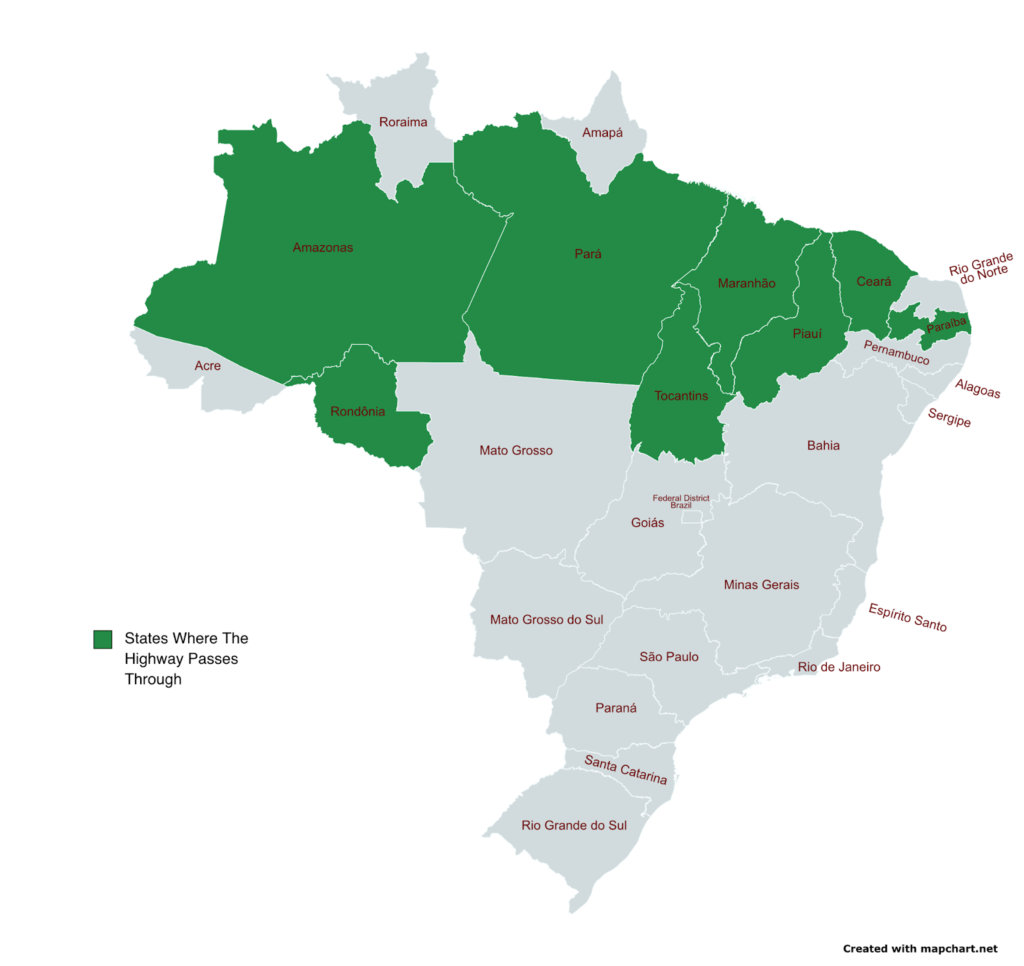
The lower house of Brazil’s Congress has approved a bill to allow conservation funds for highway pavement through the heart of the Amazon rainforest. Scientists say the road through most of Brazil’s best-preserved rainforest state could threaten the existence of the rainforest and encourage deforestation.
Spanning eight countries, the world’s largest tropical rainforest is often called the “lungs of the planet” due to its indispensable role in converting massive amounts of carbon dioxide into oxygen.
Last December, the lower house of Brazil’s Congress passed BR-319, permitting the highway project to be financed by conservation money donated to Brazil. Lawmakers call the project a “critical infrastructure [and] indispensable to national security, requiring the guarantee of its trafficability,” as reported by Reuters.
The bill also includes the $1.2 billion Amazon Fund, which supporters in the United States and Europe finance. The bill still requires Senate approval.
Researchers and critics of BR-319 say the highway will bring forth a new era of loggers, farmers, miners and developers, as illegal deforestation and land grabs have increased in tandem with every major roadway project in the Amazon.
However, supporters of the bill insist that the states of Rondonia and Amazonas need to be less isolated from one another and connected. Currently, Manaus is only accessible through rivers and air from the rest of Brazil since BR-319 is out of commission for a large portion of the year.
“We want a road that gives us the right to go back and forth, to transport goods [and] to buy food. This is the only highway in Brazil that is not paved, we cannot treat people from the North as second-class citizens,” Alberto Neto, the bill’s author, said after its approval in the lower chamber.
The Trans-Amazonian Highway was unveiled on Sept. 27, 1972. At more than 2,000 miles long, it ranks as Brazil’s third-longest roadway and passes through the Amazon forest and the Brazilian states of Paraíba, Ceará, Piauí, Maranhão, Tocantins, Pará and Amazonas.
To populate the Amazon in the 1970s, the Fifth Brazilian Republic, or ditadura militar, built the highway. But it was abandoned, with most of the 560-mile route connecting Porto Velho in Rondonia state to Manaus in Amazonas state having turned into a rough dirt road by the late 1980s.
According to the Amazon Conservation website, deforestation has resulted in the loss of over 185 million acres in the Amazon since 1978, and the damage rate is increasing. In June 2023 representatives of Amazônia Real and Expresso reported in The Guardian that 95% of Amazon deforestation occurs within 3.4 miles of a roadway.
“This road could cause a domino effect,” Monyell Sessoms, a senior political science major and history minor from Knightdale, North Carolina, said. “The deforestation of the Amazon affects everything from the food we eat to climate change.”
Sessoms also considers the decision to pave a highway through the Amazon as an Indigenous issue. “This road will further destabilize the indigenous people that rely on the rainforest,” Sessoms said.
“Their livelihoods could completely be altered and destroyed, alongside the area’s biodiversity,” Sessoms continued.
“All major tropical forests — including those in the Americas, Africa and Southeast Asia — are disappearing, mostly to make way for human food production such as livestock and crops,” NASA’s Earth Observatory said.
According to NASA, “although tropical deforestation meets some human needs, it also has profound, sometimes devastating consequences, including social conflict and human rights abuses, extinction of plants and animals and climate change — challenges that affect the whole world.”
“I don’t think it makes any sense. This project does not fit into any of the fund’s planned support lines,” Tasso Azevedo, one of the creators of the Amazon Fund, told Climate Home News in September 2023.
Western donors to the Amazon Fund have warned against the pavement of the highway. The Amazon Fund was created in 2008 and currently has over $1.2 billion available for projects to monitor and prevent deforestation in the Amazon.
The fund’s top donors are Norway, Germany, the United States, Switzerland and the state-owned oil firm Petrobras. The fund is managed and allocated by the Brazilian Development Bank (BNDES).
A spokesperson for the German government, the fund’s second-biggest donor, told Climate Home News that support for the project “is not possible” as the fund’s rules were explicitly set up to reduce forest destruction in the Amazon.
The U.S. is “confident” the fund will use its resources “consistent with its governing regulations,” a U.S. State Department spokesperson told Climate Home News.
Western donors have promised to donate an additional $800 million to the fund since President Lula da Silva signed seven executive orders for environmental protection on his first day in office in 2023 after three years of inactivity. Funding was stopped in 2019, under the previous government of Jair Bolsonaro, after the former president unilaterally suspended the board of directors and the technical committee of the fund.
Camille Ross, a senior history major from Philadelphia, Pennsylvania, worries about the effect this will have on the climate, saying, “Given the destabilizing effects climate change has already brought upon us, passing laws that jeopardize an ecological body as important as the Amazon is incredibly dangerous.”
Ross called on lawmakers globally to “reckon with the times we’re in now and dedicate greater resources and imagination to how we build societies that won’t continue on a destructive path.”
Copy edited by Alana Matthew

